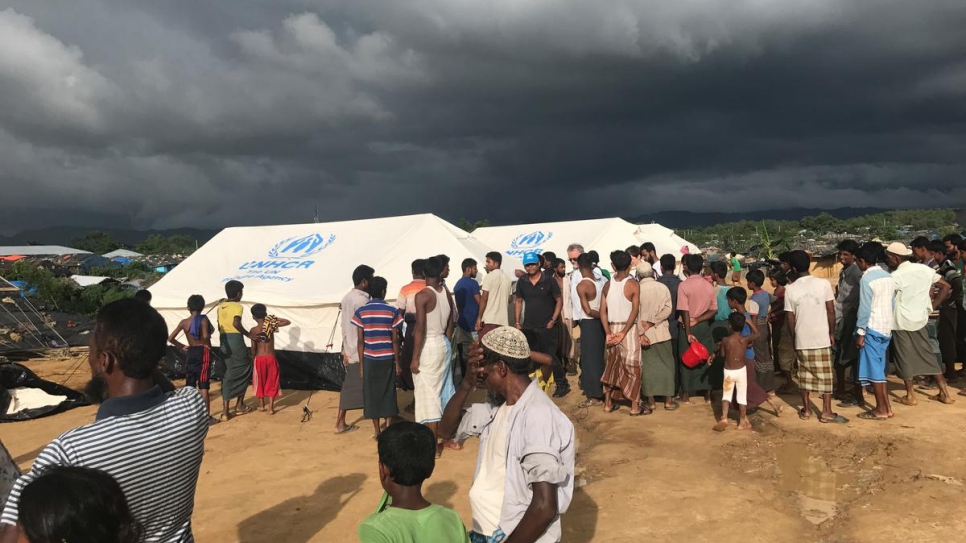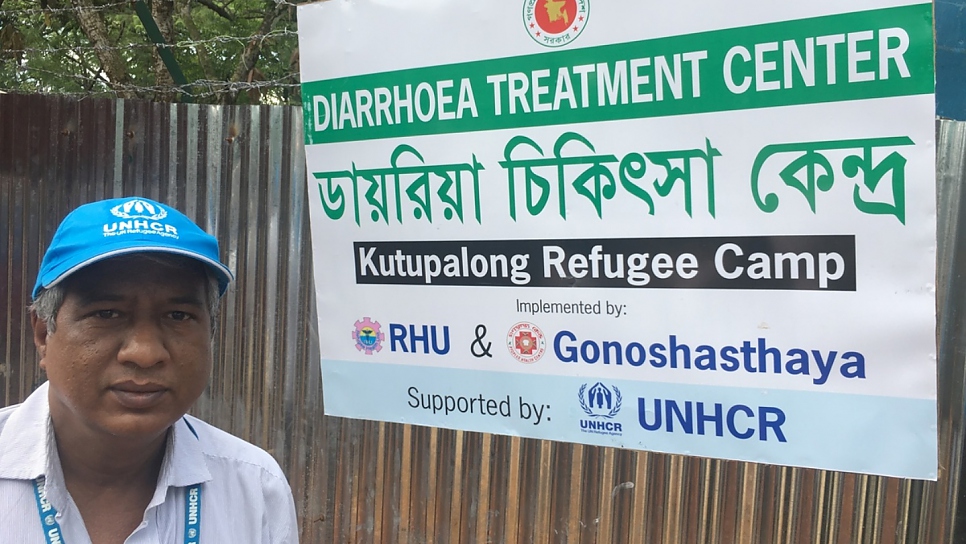Name: Taimur Hasan, 50, from Bangladesh.
Job title: Public Health Officer. Fifteen years with UNHCR, working in Bangladesh and Nepal, and on emergency assignment in Iraq.
Why did you become an aid worker?
As a doctor, my primary goal is to help people. Working in the public health field, I saw that I could be more effective in a humanitarian role. In this job I find I come across a lot of people with many needs and, when I can do something for them, it gives me great satisfaction. You can’t always save a life, but you can give comfort to the patient in their suffering.
What are the most rewarding/challenging things about your job?
More than 720,000 Rohingya refugees from Myanmar have fled to south-eastern Bangladesh since late August 2017.
At the beginning of the influx, thousands of people were coming every day. It scared us, because we did not expect so many to arrive in such a short time. A lot of them had walked a long way, they had gone without food for many days and they did not sleep properly, so their immune systems were very low.
We also found that a quarter of children under five were suffering from malnutrition and most had never received immunization for common conditions. So, at the start of the influx, more than 600 people came down with measles, and in the following weeks more than 200,000 were treated for acute diarrhoea because the water and sanitation facilities were inadequate. An outbreak of diphtheria sickened nearly 7,000 people. Remarkable teamwork among the agencies, under the leadership of the Bangladesh government’s ministry of health, brought it under control.
Not all the health problems were physical. It was also very challenging to see the huge mental pressure everyone was under. First, the violence that refugees witnessed in their country, then the crossing to Bangladesh often on foot, without food or shelter, and then the conditions here. Everyone is very scared for their future, because they don’t know what will happen.
At the start of the influx, we operated just one clinic out of a tent. Now we support 15 primary care facilities with our partners, including the refugee health unit of the Refugee Relief and Repatriation Commissioner’s office, and the non-governmental organizations Medical Teams International, Research, Training and Management International, Relief International, and Gonoshasthaya Kendra. We have also set up diarrhoea treatment units and nutritional centres. An immunization campaign with our aid partners has now covered 90 per cent of children.
The fact that I could contribute to the response makes me proud. For a doctor, helping people in need is our greatest satisfaction.
Worst day at work?
There were many bad days, many worst days, particularly at the start of the emergency. Seeing so many people out in the road, with no shelter and only water and wild rice to eat - because we could not provide food for everyone - was particularly difficult. But there is one day that stays in my mind.
I was working at Kutupalong settlement and I got a call from the reception centre saying ‘please come’. I rushed over there and found a young man carrying a basket wrapped with a cloth. I asked him to remove the cloth and I saw two tiny babies inside. They were twins.

A Rohingya refugee father carries newborn twins in a basket, Kutupalong, Bangladesh, September 2017. Their mother gave birth fleeing Myanmar on foot. © UNHCR/Vivian Tan
The mother was so scared, tiny and exhausted. She had delivered the twins while she was crossing the jungle from Myanmar. She didn’t have food, she didn’t have anything. She was very sick. That struck me a lot. I felt both shock and pity. Pity for the mother that she could not deliver in a dignified way. But shocked, too, at seeing the condition the parents were in and, of course, the babies themselves.
What was your best day at work?
We immediately took the mother and newborns into the maternity unit of the primary care clinic. The babies’ umbilical cords were cleaned and clamped. The mother received food supplements and the medical care that she needed. My best day was the following day, when I got to see them again.
The twins were wrapped in a nice towel, and the mother was smiling. She felt secure and safe. Not for herself, but for her kids, so that made me very satisfied and happy. I was also very thankful to God that I could do something for the mother.
Your support is urgently needed to help the children, women and men refugees in Bangladesh. Please give now.
The UN Refugee Agency works in 128 countries helping men, women and children driven from their homes by wars and persecution. Our headquarters are in Geneva, but most of our staff are based in the field, helping refugees. This profile is part of a series highlighting our staff and their work.





